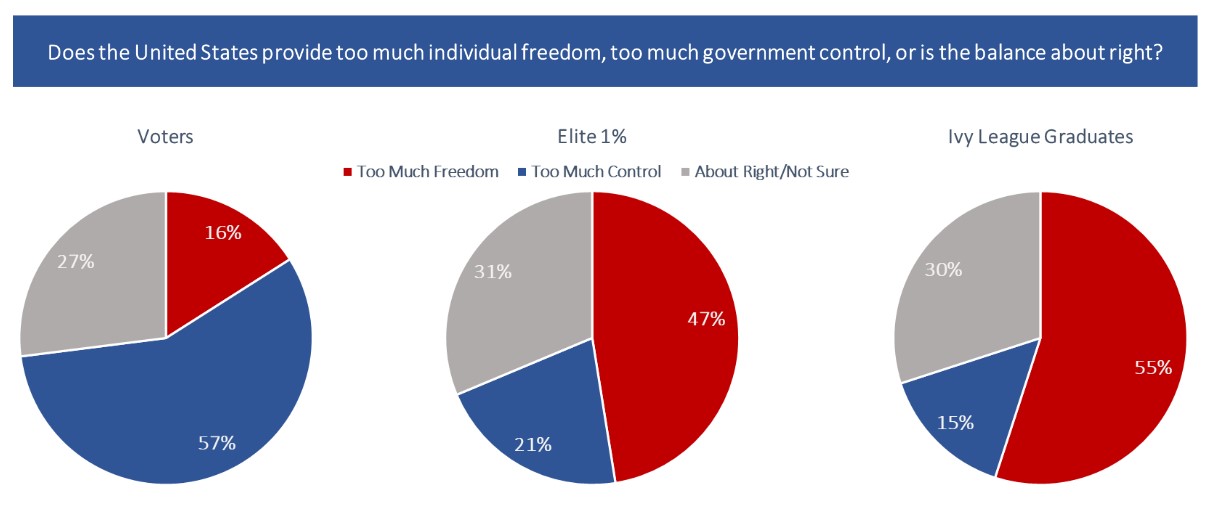


I briefly covered this earlier but this merits more than a mention.
Elites want to save the planet by banning SUVs and jet plane vacations
They're much bigger fans of Joe Biden and the government than regular voters
ers
By James Reinl, Social Affairs Correspondent, For Dailymail.Com
This is shocking stuff. They're monsters from a science fiction movie.
'To understand that is to understand the divide in contemporary American politics.'
The full survey, "Them vs. U.S.," is here.
Favorable Opinion of the Members of the Talking Professions
At most, half of Americans have a favorable opinion of lawyers, lobbyists, union leaders, or journalists. However, almost 80% of the elites hold a favorable opinion of this group of professionals, and nearly 90% of the elite college attendees do. As for members of Congress, 28% have a favorable opinion versus 67% of Elites.
Here's the executive summary:"Let me tell you about the very rich. They are different from you and me. They possess and enjoy early, and it does something to them, makes them soft where we are hard, and cynical where we are trustful, in a way that, unless you were born rich, it is very difficult to understand. They think, deep in their hearts, that they are better than we are because we had to discover the compensations and refuges of life for ourselves. Even when they enter deep into our world or sink below us, they still think that they are better than we are. They are different."
- F. Scott Fitzgerald
The people who run America, or at least think they do, live in a bubble of their own construction. They've isolated themselves from everyday America's realities to such a degree their views about what is and what should be happening in this country differ widely from the average American's.
An analysis of their thinking, conducted for the Committee to Unleash Prosperity, finds that on a variety of economic, social, and political issues, there exists a wide gap between how the top 1% -- the Elites -- think things should be and how the rest of America looks at them.
Elite thinking, as it's termed, is under attack -- and rightly so -- for being out of step with the rest of the country.
Below, we highlight some of the profound attitudinal differences between elites and average Americans:
In a time when most Americans have suffered a loss of real take-home pay, 74% of elites say they are financially better off today than in the past versus 20% of all Americans.
� Nearly six in ten say there is too much individual freedom in America -- double the rate of all Americans.
� More than two-thirds (67%) favor rationing of vital energy and food sources to combat the threat of climate change.
� In stark contrast to the rest of America, 70% of the Elites trust the government to "do the right thing most of the time."
� Two-thirds (67%) say teachers and other educational professionals should decide what children are taught rather than letting parents decide.
� Somewhere between half and two-thirds favor banning things like SUVs, gas stoves, air conditioning, and non-essential air travel to protect the environment.
� About six of ten elites have a favorable opinion of the so-called talking professions- lawyers, lobbyists, politicians, and journalists.
� President Joe Biden enjoys an 84% job approval rating from this group -- roughly twice as high as the general public.
...
The Elites represent 1% of the U.S. population but have an outsized voice on public policy in the United States, with their views seeming somehow to dominate the national conversation.
This may be because it is the Elites themselves who determine what that conversation will be about on campus, in the legacy media, and corporate board rooms. Not surprisingly, these people talk about politics far more than most Americans. The data show that nearly a third of them (30%) talk about politics daily or almost every day. Just 9% of the voting public do. It is worth noting that members of the Elites who talk about politics daily have views that are even further removed from the opinions of the voting public.
This is true even when the Elites self-identify as Republicans. They typically may be more conservative than Elite Democrats but they still have attitudes and opinions that are far removed from those of the typical American voter. The Elite class -- regardless of party -- is an exclusive club that sees and experiences America through a different lens than ordinary Americans.
